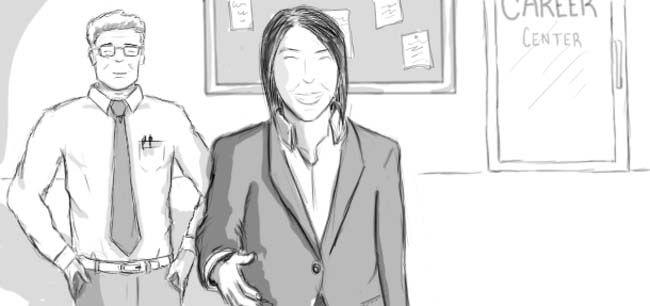Over the last decade, administrators, students and graduates of the College of William and Mary have been forced to reckon with a new reality: While the demand for a college education has skyrocketed, it no longer guarantees career and financial success, as it once did. It is no longer enough for students to earn a degree; they need to develop marketable skills and build a resume through internships and jobs that reflect their interests. This can be a daunting journey many of us are prone to put off. The Sherman and Gloria H. Cohen Career Center can help us along the way, but it must be more integrated into the College experience. Upon arrival, freshmen should be assigned a general career advisor to guide them through the basics of resume building and job searching, while helping them understand where their interests and skills could lead them.
Freshmen and sophomores can already take advantage of the Career Center’s Compass Program, a series of workshops geared toward resume writing, interviewing, searching for internships and jobs, applying to graduate school, creating a LinkedIn profile, and other career-related activities. Students have much to gain from this program, but they might not learn about it until it is too late. Juniors may fall behind, not having put enough time and thought into the process. This is not necessarily out of laziness; people often procrastinate doing things they care about most because they don’t know how to approach them. The College should require freshmen to take more initiative in the process; that way, even students uncertain about their post-graduation plans will recognize their options.
A career advisor early on would be invaluable to students, especially students whose career opportunities are not obvious. Having advisors as freshmen would encourage students to get involved with the Career Center and the Compass Program and to learn about how their prospective majors could translate into careers. Advisors could connect students with relevant organizations and employers as well as provide them with networking tips. They could help students develop career goals and make sure they stick to them. Advisors could identify skills and useful experiences their students had not even considered. Once senior year arrives, students would have an ally who has known them from the beginning in addition to a stronger sense of direction. These relationships could give structure to an otherwise messy and anxiety-ridden process.
According to the Career Center’s annual “career outcome” survey, to which 66 percent of the College’s class of 2013 responded, a record 59 percent were employed within five months after graduating; another 29 percent were in graduate school. While this survey does not tell us everything, it shows that graduates of the College are generally succeeding. However, competition for employment and graduate school will only get stronger, and just as students will need to improve, so will the resources the College provides them. Assigning career advisors to incoming freshmen will make students more competitive and knowledgeable about their choices. Most of all, students will feel less alone and will benefit from a relationship with someone who understands their temperament and unique skills.

